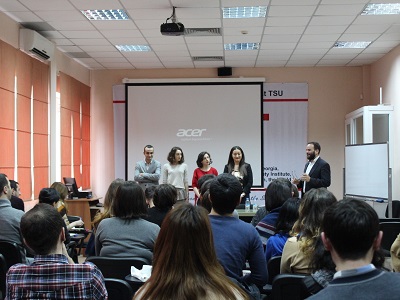- Details
On February 20, ISET students delivered yet another policy seminar. The seminar was opened by Eric Livny, the president of ISET, who delivered an inspirational speech regarding the jobs of the future. He posed the question, “In this rapidly changing world, what do we need to teach schoolchildren today so that their skills and knowledge are still relevant ten or twenty years from now?”. This could be considered something of a million-dollar question, since in the next few decades, artificial intelligence seems likely to push humans out of the job market; if the Industrial Revolution of the 19th century created such a massive urban working class, the new technology revolution will create a massive class of useless people. Mr Livny also talked about the issue of degree inflation, and the disoriented universities that contribute to unemployment all over the world with meaningless degrees. As formal certification gradually loses its power, Mr Livny's suggestion was to create an online skills platform where those who offer their services are assessed by the number of stars.
- Details
On January 27, ISET students delivered yet another policy seminar. A presentation entitled “The Quality of Secondary Education” was delivered by Mariam Chachkhiani, Lika Goderdzishvili, Dika Khidesheli, and Tevos Matevosyan under the supervision of a senior research fellow in the Education and Social Policy Center at ISET-PI, Zurab Abramishvili. During the presentation, the students overviewed the current situation and indicators of the quality of secondary education in Georgia, Armenia, and Azerbaijan, with further emphasis made on problems facing Georgia.
At the beginning of the presentation, the students showed a short video on the Finnish education system, “where learning is meant to be fun”. Students have no homework, with both short school days and semesters. The Finnish system perceives standardized test-based system (like in US) to be studying for test; it does not encourage students to learn. Another important point is that private schools do not exist in Finland, and Finnish people think that neighborhood schools are the best.












